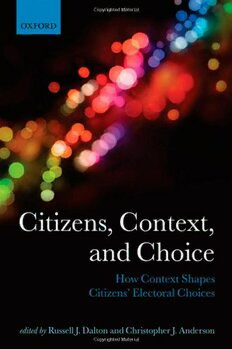
Citizens, Context, and Choice: How Context Shapes Citizens' Electoral Choices (Comparative Study of Electoral Systems) PDF
314 Pages·2011·1.085 MB·English
Most books are stored in the elastic cloud where traffic is expensive. For this reason, we have a limit on daily download.
Preview Citizens, Context, and Choice: How Context Shapes Citizens' Electoral Choices (Comparative Study of Electoral Systems)
Description:
A large body of electoral studies and political party research argues that the institutional context defines incentives that shape citizen participation and voting choice. With the unique resources of the Comparative Study of Electoral Systems, this book provides the first systematic evaluation of this topic. A distinguished international team of electoral scholars finds that the institutional context has only a modest impact on citizen political choices compared to individual level factors. Furthermore, the formal institutional characteristics of electoral systems that have been most emphasized by electoral studies researchers have less impact than characteristics of the party system that are separate from formal institutions. Advanced multi-level analyses demonstrate that contextual effects are more often indirect and interactive, and thus their effects are typically not apparent in single nation election studies. The results have the potential to reshape our understanding of how the institutional framework and context of election matters, and the limits of institutional design in shaping citizen electoral behavior.
See more
The list of books you might like
Most books are stored in the elastic cloud where traffic is expensive. For this reason, we have a limit on daily download.
